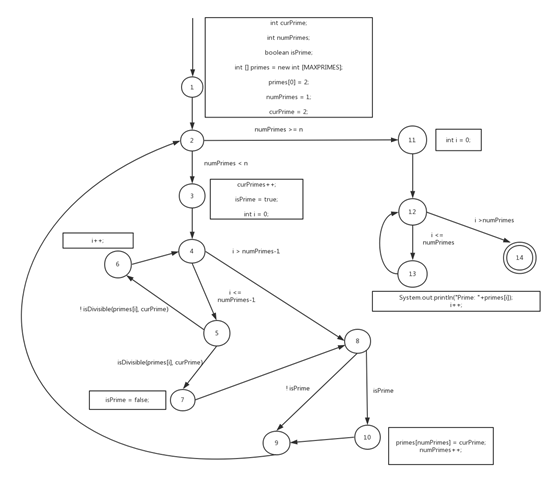Software Testing Homework3
Software Testing Homework3
/**
* Finds and prints n prime integers
* Jeff Offutt, Spring 2003
*/
private static void printPrimes(int n) {
int curPrime; //Value currently considered for primeness
int numPrimes; // Number of primes found so far;
boolean isPrime; //Is curPrime prime?int[] primes = new int[MAXPRIMES];// The list of primes.
// Initialize 2 into the list of primes.
primes[0] = 2;
numPrimes = 1;
curPrime = 2;
while(numPrimes < n) {
curPrime++; // next number to consider...
isPrime = true;
for(int i = 0; i <= numPrimes; i++ ) {
//for each previous prime.
if(isDvisible(primes[i],curPrime)) {
//Found a divisor, curPrime is not prime.
isPrime = false;
break;
}
}
if(isPrime) {
// save it!
primes[numPrimes] = curPrime;
numPrimes++;
}
}// End while
// print all the primes out
for(int i = 0; i < numPrimes; i++) {
System.out.println("Prime: " + primes[i] );
}
}// End printPrimes.
(a) Draw the control flow graph for the printPrime() method.
(b) Consider test cases ti = (n = 3) and t2 = ( n = 5). Although these tour the same prime paths in printPrime(), they don't necessarily find
the same faults. Design a simple fault that t2 would be more likely to discover than t1 would.
(c) For printPrime(), find a test case such that the corresponding test path visits the edge that connects the beginning of the while statement
to the for statement without going through the body of the while loop.
(d) Enumerate the test requirements for node coverage, edge coverage,and prime path coverage for the path for printPrimes().
Answer:
(a):

(b):
the index of the array out of bounds.
(c):
n=1
(d):
Node coverage:
TR = {1,2,3, 4,5,6,7,8,9,10,11,12,13,14}
Edge coverage:
TR = {(1,2),(2,3),(2,11),(3,4),(4,5),(4,8),(5,6),(6,4),(7,8),(8,9),(10,9),(9,2),(12,13),(12,14),(13,12),(11,12),(5,7),(8,10)}
Prime path coverage:
TR = {(1,2,3,4,5,7,8,9),(1,2,3,4,5,7,8,10,9),(1,2,3,4,8,9),(1,2,3,4,8,10, 9),(1,2,11,12,13),(1,2,11,12,14),(1,2,3,4,5,6)
(2,3,4,5,7,8,9,2),(2,3,4,5,7,8,10,9,2),(2,3,4,8,9,2),(2,3,4,8,10,9,2),
(3,4,5,7,8,9,2,3),(3,4,5,7,8,10,9,2,3),(3,4,5,8,10,9,2,3),(3,4,5,8,9,2,3),(3,4,5,7,8,9,2,11,12,14),(3,4,5,7,8,10,9,2,11,12,14),(3,4,8,9,2,11,12,14),(3,4,8,10,9,2,11,12,14)
(4,5,6,4),(4,5,7,8,9,2,3,4),(4,5,8,10,9,2,3,4),(4,8,9,2,3,4),(4,8,10,9,2,3,4),
(5,6,4,5),(5,7,8,9,2,3,4,5),(5,7,8,10,9,2,3,4,5),(5,6,4,8,9,2,11,12,14),(5,6,4,8,10,9,2,11,12,14),
(6,4,5,6),
(7,8,9,2,3,4,5,7),(7,8,10,9,2,3,4,5,7),(7,8,9,2,3,4,5,6),(7,8,10,9,2,3,4,5,6)
(8,10,9,2,3,4,5,7,8),(8,9,2,2,3,4,5,7),(8,9,2,3,4,8),(8,10,9,2,3,4,8),(8,10,9,2,3,4,5,6),(8,9,2,3,4,5,6),
(9,2,3,4,5,7,8,9),(9,2,3,4,5,7,8,10,9),(9,2,3,4,8,10,9),(9,2,3,4,8,9),(9,2,3,4,5,6)
(10,9,2,3,4,8,10),(10,9,2,3,4,5,7,8,10),(10,9,2,3,4,5,6),
(12,13,12),(13,12,13),(13,12,14)
Prime path coverage test:
Primes.java:
package cn.tju.scs;
public class Primes {
private static final int MAXPRIMES = 100;
public Primes() {
}
public String printPrimes (int n) {
String prime = new String();
int curPrime;
int numPrimes;
boolean isPrime;
int [] primes = new int [MAXPRIMES];
primes [0] = 2;
numPrimes = 1;
curPrime = 2;
while (numPrimes < n) {
curPrime++;
isPrime = true;
for (int i = 0; i <= numPrimes-1; i++) {
if (curPrime%primes[i]==0) {
isPrime = false;
break;
}
}
if (isPrime) {
primes[numPrimes] = curPrime;
numPrimes++;
}
}
for (int i = 0; i <= numPrimes-1; i++) {
prime += primes[i] + " ";
}
return prime;
}
}
PrimesTest.java:
package cn.tju.scs;
import static org.junit.Assert.*;
import org.junit.After;
import org.junit.Before;
import org.junit.Test;
public class PrimesTest {
private Primes primes;
@Before
public void setUp() throws Exception {
primes = new Primes();
}
@After
public void tearDown() throws Exception {
}
@Test
public void test1() {
assertEquals("2 3 5 ", primes.printPrimes(3));
}
@Test
public void test2() {
assertEquals("2 3 5 7 11 ", primes.printPrimes(5));
}
}



